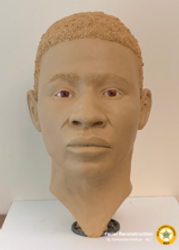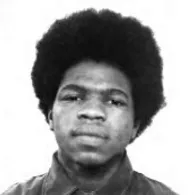(YOUNGSTOWN, Ohio) — Old-fashioned detective work, modern DNA technology, and a serendipitous tip that was offered in one case but proved vital in another case have led to the identification of two John Does in northeast and central Ohio, Attorney General Dave Yost announced this afternoon.
Youngstown Mayor Tito Brown, Youngstown Police Chief Carl Davis and Fayette County Sheriff Vernon Stanforth joined Yost at the press conference.
“Cases like these are why I created BCI’s cold case unit,” AG Yost said. “It’s to put the pieces together and assist local law enforcement so they can help bring closure to loved ones.”
 In August 2022, the Bureau of Criminal Investigation (BCI) unveiled the facial reconstruction of a Mahoning County John Doe found in 1987 in hopes that the 3D-rendering would jump start the cold case.
In August 2022, the Bureau of Criminal Investigation (BCI) unveiled the facial reconstruction of a Mahoning County John Doe found in 1987 in hopes that the 3D-rendering would jump start the cold case.
Not long after, Youngstown police began to receive tips, including one that ultimately did not relate to their case but that detectives thought might be valuable in a different case elsewhere in the state.
In turn, detectives forwarded the information to BCI, which realized its relevance to a Fayette County human remains case dating back to 1981. The tip proved to be the missing piece that lead to the identification of Theodore Long.
Facial Reconstruction
 Long’s body was found Nov. 17, 1981, in Paint Creek near Lamp Road. Deputies from the Fayette County Sheriff’s Office diligently worked the case and had partnered with BCI’s Cold Case Unit in April 2022 to review potential new leads.
Long’s body was found Nov. 17, 1981, in Paint Creek near Lamp Road. Deputies from the Fayette County Sheriff’s Office diligently worked the case and had partnered with BCI’s Cold Case Unit in April 2022 to review potential new leads.
“It gives us some comfort that we no longer have to refer to this person by a location, but instead his name: Teddy Long,” Fayette County Sheriff Vernon Stanforth said. “Our condolences go out to the family who has been looking for 41 years to identify their loved one. We have an appreciation for the Youngstown Police Department and BCI for their assistance. Now our work begins to solve a homicide.”
Theodore Long
Long’s case remains an ongoing homicide investigation led by the Fayette County Sheriff’s Office.
In the meantime, detectives in Youngstown continued working their John Doe case. With the help of genetic genealogy research funded by the Porchlight Project, a nonprofit that offers support for families of missing and murdered persons, detectives ultimately determined the Mahoning County John Doe to be Robert Sanders.
 “Each day, the greatest men and women in our country don the uniform and put their lives on the line to keep us safe in our homes, one our way to school, and as we enjoy a nice dinner out on the town,” said Carl Davis, Youngstown Chief of Police. “Those same men and women are driven by an inherent desire to solve the cases they investigate and provide resolution so that not only may the criminals be brought to justice, but that families can help find some peace in their lives.”
“Each day, the greatest men and women in our country don the uniform and put their lives on the line to keep us safe in our homes, one our way to school, and as we enjoy a nice dinner out on the town,” said Carl Davis, Youngstown Chief of Police. “Those same men and women are driven by an inherent desire to solve the cases they investigate and provide resolution so that not only may the criminals be brought to justice, but that families can help find some peace in their lives.”
Robert Sanders
Law enforcement is increasingly turning to genetic genealogy to put a name to human remains that have long defied all other methods of identification. A relatively new tool, genetic genealogy involves comparing a John Doe’s DNA to DNA submitted voluntarily to commercial databases by members of the public. The more genetic variations, or markers, that any two people have in common, the nearer they are on the family tree. Subsequent research involving a search of public records allows a genetic genealogist to fill in the branches of the tree and to ultimately connect the John Doe’s DNA to a family with a missing person.
Anyone with information in the investigation regarding Theodore “Teddy” Long is encouraged to contact the Fayette County Sheriff’s Office at 740-335-6170.
Anyone with information in the investigation regarding Robert Sanders is encouraged to contact the Youngstown Police Department at 330-742-8900.










